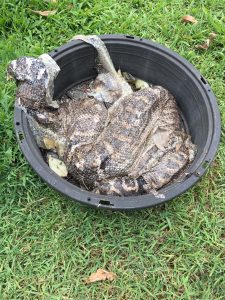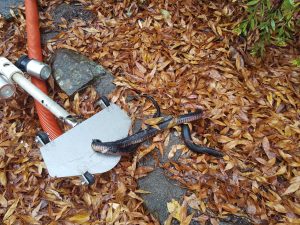What do you do if you find a snake in your water tank?
You would be surprised how often we find snakes, alive and dead, in rainwater tanks. Like all reptiles/animals, snakes need water to survive. And as we head into the heat of summer, they need a reliable source, and your water tank is perfect!
Not only do snakes need to drink, but their main food source does too. Mice, rats, and frogs, for example, all look for a water supply when the temperatures rise. Finding your water tanks means these critters can also attract snakes.
For Pristine Water Systems operators, snakes in water tanks is a regular occurrence. For most of us, it still scares the bejeebers out of us. Majority of our customers rarely check their water tanks, relying on us to ensure the water quality is 100%, but only contacting us when they find a problem such as smelly or foul tasting water.
Dead snakes are worse than live snakes!
Although a live snake popping its head out when we lift a water tank lid can scare the living hell out of you, the worse case scenario is we call in a local snake expert to remove and relocate the unwanted slithering water seeker.
Snakes can’t survive in water indefinitely. Some will cling to internal pipework to keep out of the water. Ladders and ‘floats’ (which provide indication of water levels) are other common safety nets when they are caught in a tank.
Trapped snakes will eventually lose their strength and can drown in your water tank. At this point, the reptiles’ carcass starts to decompose. Rotting meat that festers in your drinking water will develop bacteria, which can be life threatening if you drink the contaminated water.
Unfortunately, you don’t know the water is contaminated until the physical signs are there:
- Smelly water
- Foul tasting water
- Illness in the household
So what do you do if you have a snake in your water tank?
Firstly, a live snake …. Call the experts! If you know the type of snake, and that it isn’t a threat if it bites, then certainly consider removing yourself. But if you are unsure, just let the experts do their thing.
Dead snakes require a lot more effort.
Removing the carcass from your water will not disinfect and sanitise the tank and the water itself.
Traditionally, you would drain your water tank, jet wash it out and maybe use chlorine to disinfect. But if you are like us, you don’t want to consciously use harmful chemicals or to lose a full tank of water. And besides, who likes the taste of chlorinated water anyway?
At Pristine Water Systems, we use a unique sanitising disinfectant. AqueousPro™ 50 (not for public sale) and AqueousPro™ 7.8 (available to the public), which are the two products we use to ensure your water is suitable to drink. No matter what it had growing/dying in it beforehand.
We remove the carcass and any solids from the existing water, we then “clean the water” with our sanitiser, and we test the water quality when we are done. Leaving you with usable water.
Additional tips
- Check your water tank regularly. A quick look in the tank on a regular basis will help to catch any problems, such as snakes/reptiles that have been stuck in there.
- If your tank lid or strainer is broken, replace it! For a small cost, you could replace your lid/strainer with ones designed to keep animals out. But also consider strainers that help keep sunlight out, reducing the potential for algae to grow inside your tank. Pristine Water Systems has these available.
- Repair any holes or cracks in your tank. Even the smallest of repairs will help prevent insects, reptiles and animals getting in. This includes tree root systems that have breached the tank and are growing.
For a great video on an expert extracting a snake from a water tank, watch the following video:
http://digg.com/video/rescuer-snake-watertank?jwsource=cl
 But why do we always remind you about these things, do snakes carry germs?
But why do we always remind you about these things, do snakes carry germs?
Turtles, snakes, geckos, lizards, and other reptiles are wild animals who carry diseases, bacteria, and infections. Salmonella bacteria is just one of many zoonotic diseases, diseases that can jump from an animal to a human. These diseases place public health at risk.
(Source: https://www.worldanimalprotection.us/blogs/wild-animals-salmonella-outbreak)
Can snakes contaminate water?
Snakes, like many other animals (whether domesticated or wild), can carry a host of diseases and bacteria that can make us humans seriously sick. Imagine a dead snake floating in your water tanks for weeks, this will give you and your family the risk of getting a plethora of diseases. Also, snakes can unintentionally get into your water supply too.
Contaminated water can cause severe gastrointestinal illnesses. If you think there’s something wrong with your water supply, believe in your guts. You might be surprise what’s lurking inside your tanks!


